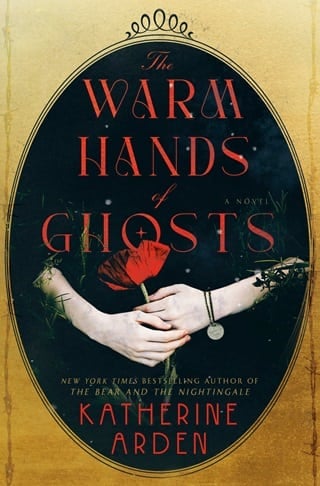Chapter 4: The Bottomless Pit
PASSCHENDAELE RIDGE, FLANDERS, BELGIUM
November 1917
He couldn’t see anything.
Couldn’t hear anything either, since the shell came down. His ears were still ringing. He thought, This is death, and tried to let go.
And perhaps he did, for a time. His mind drifted. His body seemed far away. He’d been at the door of the pillbox, flinging a— No. He wasn’t sure what had happened. He remembered the rattle of a machine gun, rain and bullets smacking together into the mud.
He remembered running like an animal, dead bodies, gray uniforms, the roar of the explosion. Dickinson, a bloody froth at his lips. No—was that earlier? And now: himself in darkness. Buried. Dead and buried, wasn’t that the phrase? The shell must have collapsed the pillbox somehow. Or flipped it. Or killed him outright.
He was trapped.
He composed himself. He didn’t mind dying. Or being dead.
Was he dead? His ribs ached. And his skull. His body was all around him, hurting, inescapable. And then his other senses came back too. He smelled stagnant water, blood, cordite. The muck of his own sweat. Heard breathing. Each breath pained him. He tried to breathe less. But the sound went on.
No, it wasn’t him. It was someone else. He lurched upright. The movement arrowed pain down his stiff spine. He tried to see. Failed. It was utterly dark.
“Who’s there?” he demanded, voice wavering. “Who’s there?”
No answer. It was only the breathing, animal-loud, that told him he wasn’t alone.
Perhaps, he thought, this was hell and that nameless other was waiting to devour him. But when the breaths faltered, he didn’t know which would be worse, to be devoured by a beast or left alone in the dark.
“Hello?” he said. His head had cleared a little. He wondered if it was one of their boys or a German. Maybe, if it was a German, they could kill each other. Underground like rats. Better than waiting to die. Or— Had there been a grenade attached to his person? Somewhere? He groped. Not anymore. He had nothing but his sopping clothes, the contents of his pockets. He’d shed his pack when he charged the pillbox: his last clear memory. Had been carrying his rifle, he supposed, but it was gone now. Lost in the chaos.
“Are you wounded?” It came to him that a German wouldn’t speak English, so why bother?
Then a deep, unfamiliar voice said out of the blackness, in English, “No.” Pause. “I am dead.” An accent, but slight. Just a hardening of consonants. German, after all?
Was that a joke? He decided it was. Soldiers joked about worse things than being dead. “Damned uncomfortable for being dead.”
No answer, just a slight alteration in breathing, out instead of in. A laugh? Then the other voice said, “The air will go—soon, I think. And do you imagine”—a pause, coughing on the stink—“that anyone will—dig us out?”
“No,” he said. Outside their tomb, the Canadian Expeditionary Force was scrabbling up Passchendaele Ridge, under a sky pouring water and high explosive. A search would be as good as a suicide, and there were easier ways to kill yourself. No, he and old Fritz were dead. It didn’t matter that they were still breathing.
Shouldn’t he be more afraid? He thought, Laura, I’m sorry. He was, but distantly.
“Maybe this is hell,” he said, only half-joking. He supposed that in hell it didn’t matter if you were Canadian or German. That put the war in perspective if you liked. The devil worked in mysterious ways.
“Are you hurt?” he asked again.
Pause. “Does it matter?”
“I suppose not.”
Silence.
“I’m Wilfred Iven.”
More silence. He thought Fritz wouldn’t answer. Then—“Hans Winter.” Just the name, no service rank. Well, Freddie hadn’t offered one. A German, after all. Should he be more horrified? Then again, dead men didn’t have enemies.
Freddie touched his own face, felt his hair plastered flat with wet earth, his tin hat gone. His fingernails hurt; he’d probably torn them away when he’d scrabbled for room in the first, convulsive moments.
Increasingly afraid, he tried to speak again. “Are you—” but he couldn’t think of anything to say. He couldn’t say I’ll cut your throat for you, if you’ll do it for me. But he couldn’t just lie there either, not with fear rising in him. Goading him. The German said nothing. Where was he? “Winter?”
Silence. All Freddie could do was reach forward, blindly. The ground hurt his palms. His hand found a shoulder: a layer of mud, overlaying the sodden wool of an overcoat. “Wint—” he tried again, but, as cold as a snake, the other man’s hand closed hard about his wrist, twisting his arm, wrenching him round and over, until his face was in the soup, and he was gagging for air.
“What are you doing?” demanded the German.
Freddie tried to pull away. But the other man was immensely strong. “Answer me.”
“I’m not—I wanted—” Freddie choked.
Abruptly the hands were gone, the presence at his back was gone. He heard the rustle as the German moved away. He sat up, spitting out slimy water. If they were going to fight to the death after all, it wouldn’t be much of a fight. He tried to think what to say. “I just— It was strange, talking to—to nothing. In the dark.”
“Yes,” said the German. He’d stopped moving.
They were both silent.
Freddie wondered what Winter looked like. It was odd to think he was going to die beside someone whose face he’d never seen.
Better than dying alone. He turned so that his back was against the same unseen rubble as the German’s, close enough to hear the other man breathe. Perhaps the German felt the same fear of the silence, for he did not move away again. Freddie closed his eyes and let his mind drift.
Winter didn’t speak again.
 Fullepub
Fullepub 



